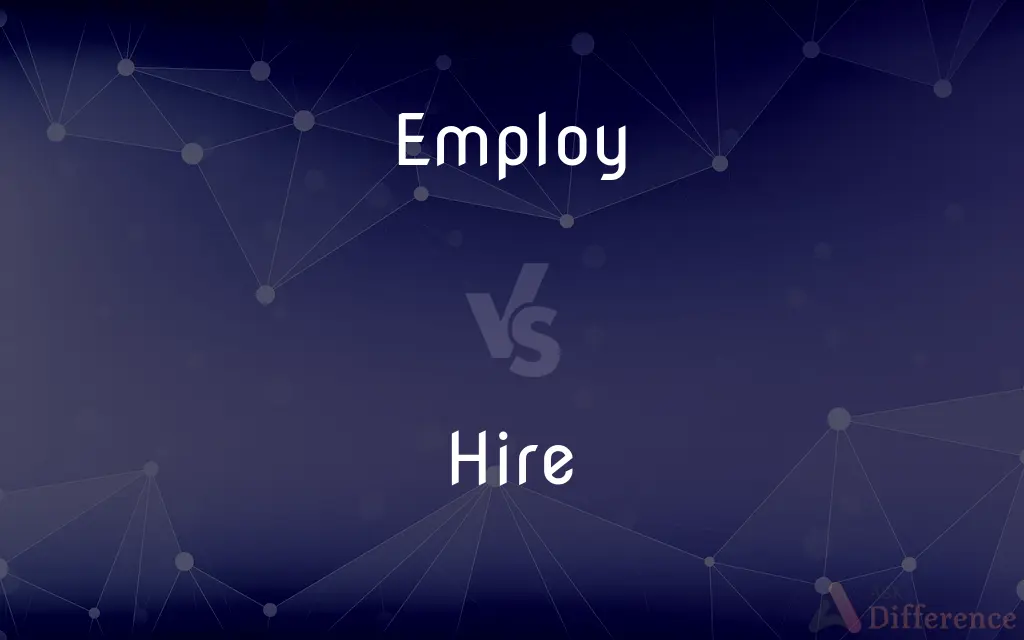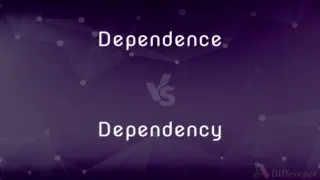Employ vs. Hire — What's the Difference?
By Maham Liaqat & Fiza Rafique — Updated on March 7, 2024
Employ refers to utilizing services or labor, while hire focuses on the act of engaging someone for a job.

Difference Between Employ and Hire
Table of Contents
ADVERTISEMENT
Key Differences
Employing someone involves not only hiring but also engaging their services over time, suggesting a continuous relationship. On the other hand, hiring often refers to the initial act of engaging someone for a job or service, focusing on the commencement of the employment relationship.
While employment typically suggests a broader scope, including the ongoing utilization and management of personnel within an organization, hiring is more narrowly focused on the process of recruitment and the selection of individuals for specific roles.
Employers are responsible for not only hiring individuals but also managing their work, providing compensation, and ensuring compliance with employment laws. In contrast, hiring might be done by employers, agencies, or intermediaries, focusing solely on filling a vacancy or need.
The term employ can also be used in a broader sense, beyond human resources, to indicate the use of resources or strategies, such as "employing a new technique." Hire, however, is predominantly used in the context of engaging human resources.
Employment relationships are typically governed by contracts, policies, and labor laws, which outline the rights and responsibilities of both parties. Hiring, as a subset of employment, is subject to many of the same regulations but is specifically concerned with the initiation of the employment relationship.
ADVERTISEMENT
Comparison Chart
Scope
Broad, includes ongoing management of personnel
Narrow, focused on the act of engagement
Relationship
Suggests a continuous, long-term association
Often refers to the initial engagement
Responsibilities
Encompasses hiring, managing, and compensating
Primarily concerned with recruitment
Context
Can extend beyond human resources
Mainly used in human resources
Legal Framework
Governed by employment contracts and laws
Governed by hiring practices and regulations
Compare with Definitions
Employ
To provide work to (someone) and pay them for it.
The company employs over 5,000 workers.
Hire
To obtain the temporary use of (something) for an agreed payment.
You can hire a boat to explore the lake.
Employ
To engage the services of (a person or persons).
They decided to employ a new marketing manager.
Hire
To engage the services of (a person or persons) for wages or other payment.
They hired a new employee to fill the vacancy.
Employ
To occupy the attention or efforts of (a person or persons).
The project employed her for three years.
Hire
To rent (something).
They decided to hire a car for the road trip.
Employ
To make use of; to use.
The strategy employs advanced technology.
Hire
To take on or employ in exchange for money.
The contractor was hired to renovate the house.
Employ
To have (someone) on the payroll; to maintain as a worker.
She has been employed by the firm since 2010.
Hire
To grant the personal services of or temporary use of for a fee.
She was hired as a consultant for the project.
Employ
Give work to (someone) and pay them for it
Temporary staff can be employed to undertake the work
The firm employs 150 people
Hire
Obtain the temporary use of (something) for an agreed payment
We flew to San Diego, hired a car, and headed for Las Vegas
Employ
Make use of
The methods they have employed to collect the data
Hire
Employ (someone) for wages
Management hired and fired labour in line with demand
Employ
The state of being employed for wages or a salary
I started work in the employ of a grocer
Hire
The action of hiring someone or something
Car hire is recommended
A hire charge
Employ
To provide work to (someone) for pay
Agreed to employ the job applicant.
Hire
A person who is hired; an employee
New hires go through six months of training
Employ
To engage the attention or activity of; occupy
Employed himself for an hour reading blogs.
Hire
To engage the services of (a person) for a fee; employ
Hired a new clerk.
Employ
To put (something) to use or service
Employed a pen to open the package.
Employed her skills in the new job.
Hire
To engage the temporary use of for a fee; rent
Hire a car for the day.
Employ
To devote (time, for example) to an activity or purpose
Employed several months in learning Swahili.
Hire
To grant the services of or the temporary use of for a fee
Hired himself out as a cook.
Hired out the cottage for the summer.
Employ
The state of being employed
In the employ of the city.
Hire
To obtain work
She hired on as a deck hand. He hired out as a photographer.
Employ
(Archaic) An occupation.
Hire
The act of hiring.
Employ
The state of being an employee; employment.
The school district has six thousand teachers in its employ.
Hire
The condition or fact of being hired.
Employ
(obsolete) The act of employing someone or making use of something; employment.
Hire
Payment for services; wages.
Employ
(obsolete) Occupation.
Hire
Payment for the use of something.
Employ
To hire (somebody for work or a job).
Yesterday our local garage employed a new mechanic.
Hire
(Informal) One who is hired
Two new hires in the sales department.
Employ
To use (somebody for a job, or something for a task).
The burglar employed a jemmy to get in.
Hire
Payment for the temporary use of something.
The sign offered pedalos on hire.
Employ
To make busy.
Hire
(obsolete) Reward, payment.
Employ
To inclose; to infold.
Hire
The state of being hired, or having a job; employment.
When my grandfather retired, he had over twenty mechanics in his hire.
Employ
To use; to have in service; to cause to be engaged in doing something; - often followed by in, about, on, or upon, and sometimes by to; as: (a) To make use of, as an instrument, a means, a material, etc., for a specific purpose; to apply; as, to employ the pen in writing, bricks in building, words and phrases in speaking; to employ the mind; to employ one's energies.
This is a day in which the thoughts . . . ought to be employed on serious subjects.
Hire
A person who has been hired, especially in a cohort.
We pair up each of our new hires with one of our original hires.
Employ
To occupy; as, to employ time in study.
Jonathan . . . and Jahaziah . . . were employed about this matter.
Thy vineyard must employ the sturdy steerTo turn the glebe.
Hire
(transitive) To obtain the services of in return for fixed payment.
We hired a car for two weeks because ours had broken down.
Employ
That which engages or occupies a person; fixed or regular service or business; employment.
The whole employ of body and of mind.
Hire
(transitive) To employ; to obtain the services of (a person) in exchange for remuneration; to give someone a job.
The company had problems when it tried to hire more skilled workers.
Employ
The state of being employed or having a job;
They are looking for employment
He was in the employ of the city
Hire
(transitive) To exchange the services of for remuneration.
They hired themselves out as day laborers.
They hired out their basement for Inauguration week.
Employ
Put into service; make work or employ (something) for a particular purpose or for its inherent or natural purpose;
Use your head!
We only use Spanish at home
I can't make use of this tool
Apply a magnetic field here
This thinking was applied to many projects
How do you utilize this tool?
I apply this rule to get good results
Use the plastic bags to store the food
He doesn't know how to use a computer
Hire
(transitive) To accomplish by paying for services.
After waiting two years for her husband to finish the tiling, she decided to hire it done.
Employ
Engage or hire for work;
They hired two new secretaries in the department
How many people has she employed?
Hire
(intransitive) To accept employment.
They hired out as day laborers.
Hire
(transitive) (neologism) (in the Jobs-to-be-Done Theory) To buy something in order for it to perform a function, to do a job
They hired a milkshake.
Hire
The price, reward, or compensation paid, or contracted to be paid, for the temporary use of a thing or a place, for personal service, or for labor; wages; rent; pay.
The laborer is worthy of his hire.
Hire
A bailment by which the use of a thing, or the services and labor of a person, are contracted for at a certain price or reward.
Hire
To procure (any chattel or estate) from another person, for temporary use, for a compensation or equivalent; to purchase the use or enjoyment of for a limited time; as, to hire a farm for a year; to hire money.
Hire
To engage or purchase the service, labor, or interest of (any one) for a specific purpose, by payment of wages; as, to hire a servant, an agent, or an advocate.
Hire
To grant the temporary use of, for compensation; to engage to give the service of, for a price; to let; to lease; - now usually with out, and often reflexively; as, he has hired out his horse, or his time.
They . . . have hired out themselves for bread.
Hire
Engage or hire for work;
They hired two new secretaries in the department
How many people has she employed?
Hire
Hold under a lease or rental agreement; of goods and services
Hire
Engage for service under a term of contract;
We took an apartment on a quiet street
Let's rent a car
Shall we take a guide in Rome?
Common Curiosities
What responsibilities do employers have after hiring someone?
Employers are responsible for managing, compensating, and ensuring the wellbeing of their employees, adhering to contracts and labor laws.
What is the main difference between employ and hire?
The main difference is that employ suggests a continuing relationship and utilization, whereas hire refers to the act of engaging someone initially.
Can a company hire without employing?
Hiring is typically the first step in employment, so while hiring can occur without immediate employment (e.g., future start date), employment usually encompasses hiring.
Is it possible to be hired but not employed?
Yes, in cases where an individual is hired for future employment or for short-term, specific tasks without entering into a continuous employment relationship.
What is the significance of employment contracts?
Employment contracts outline the terms of the employment relationship, including duties, compensation, and conditions, binding both employer and employee.
How does the gig economy impact the concepts of hiring and employing?
In the gig economy, hiring often refers to short-term engagements without traditional employment relationships, emphasizing flexibility over continuity.
Are there different considerations for hiring vs. employing in different countries?
Yes, different countries have varying regulations and cultural practices affecting hiring and employment, including contract norms and labor rights.
How do employment laws affect hiring and employing?
Employment laws govern both hiring and employing, setting standards for fair practices, discrimination prevention, and worker rights and protections.
What role do recruitment agencies play in hiring and employment?
Recruitment agencies facilitate hiring by connecting employers with potential employees, though the ongoing employment relationship is between the employer and the employee.
Can "hire" be used in contexts outside of employment?
Yes, "hire" can also refer to renting objects or obtaining services on a temporary basis, not just engaging personnel.
Share Your Discovery

Previous Comparison
Dependence vs. Dependency
Next Comparison
Moment vs. SpellAuthor Spotlight
Written by
Maham LiaqatCo-written by
Fiza RafiqueFiza Rafique is a skilled content writer at AskDifference.com, where she meticulously refines and enhances written pieces. Drawing from her vast editorial expertise, Fiza ensures clarity, accuracy, and precision in every article. Passionate about language, she continually seeks to elevate the quality of content for readers worldwide.














































